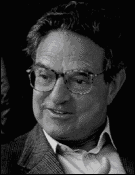 |
| George Soros |
| Born: | |
| Affiliations: |
|
| Most Famous For: | George Soros gained international notoriety when, in September of 1992, he risked $10 billion on a single currency speculation when he shorted the British pound. He turned out to be right, and in a single day the trade generated a profit of $1 billion – ultimately, it was reported that his profit on the transaction almost reached $2 billion. As a result, he is famously known as the "the man who broke the Bank of England." Soros is also famous for running the Quantum Fund, which generated an average annual return of more than 30% while he was at the helm. Along with the famous pound trade, Soros was also cited by some as the "trigger" behind the Asian financial crisis in 1997, as he had a large bet against the Thai baht. He is also widely known for his political activism and philanthropic efforts. |
Personal Profile
Soros fled Hungary in 1947 for England , where he graduated from the London School of Economics in 1952 and then obtained an entry-level position with an investment bank in London United States and held analyst and investment management positions at the New York
Soros went off on his own in 1973, founding the hedge fund company of Soros Fund Management, which eventually evolved into the well-known and respected Quantum Fund. For almost two decades, he ran this aggressive and successful hedge fund, reportedly racking up returns in excess of 30% per year and, on two occasions, posting annual returns of more than 100%.
In the late 1980s, he gave up the day-to-day management of the Quantum Fund and, as one of the wealthiest people in the world, became a substantial philanthropist, donating huge sums worldwide through his Open Society Foundation.
In recent years, political activism has also become important to Soros. He has written and lectured extensively on the role of the U.S.
When Soros was offered an honorary degree from Oxford University
Investment Style
George Soros was a master at translating broad-brush economic trends into highly leveraged, killer plays in bonds and currencies. As an investor, Soros was a short-term speculator, making huge bets on the directions of financial markets. He believed that financial markets can best be described as chaotic. The prices of securities and currencies depend on human beings, or the traders - both professional and non-professional - who buy and sell these assets. These persons often act out based on emotion, rather than logical considerations.
He also believed that market participants influenced one another and moved in herds. He said that most of the time he moved with the herd, but always watched for an opportunity to get out in front and "make a killing." How could he tell when the time was right? Soros has said that he would have an instinctive physical reaction about when to buy and sell, making is strategy a difficult model to emulate.
When he fully retired in 2000, he had spent almost 20 years speculating with billions of other people's money, making him - and them - very wealthy through his highly successful Quantum Fund. He made some mistakes along the way, but his net results made him one of the world's wealthiest investors in history.
Publications
- "The Alchemy Of Finance" by George Soros (1988)
- "Soros On Soros: Staying Ahead Of The Curve" by George Soros(1995)
- "Open Society: Reforming Global Capitalism" by George Soros(2001)
- "The Bubble Of American Supremacy: Correcting The Misuse Of American Power"by George Soros(2003)
- "Soros: The Life And Times Of A Messianic Billionaire" by Michael Kaufman(2002)
Quotes
"It's not whether you're right or wrong that's important, but how much money you make when you're right and how much you lose when you're wrong."
"I rely a great deal on animal instincts."
"Playing by the rules, one does the best he can, irrespective of the social consequences. Whereas in making the rules, people ought to be concerned with the social consequences and not with their personal interests."
"George opened all of our thinking to macroeconomic theory, and he made globalists of us all by making us understand the importance of geopolitical events on the U.S.
No comments:
Post a Comment